Pradeepan K.K., 48, stares at the intensive care unit of Aster Medicity hospital near Kalamassery in central Kerala, in a grief-stricken daze. Clutching a handkerchief soaked in tears, he recalls the moment when his world turned upside down.
On the morning of October 29, Pradeepan’s wife Saly and their three children — Praveen, Rahul, and Libina — left home to attend the annual three-day zonal meeting of Jehovah’s Witnesses, a millenarian Christian group, in Kalamassery, a municipal town located about 10 kilometres from Kochi city. They were there to pray and deliberate on the theme ‘exercise patience’.
Moments after the 2,000-odd attendees closed their eyes in prayer, two blasts ripped through the Zamra International Convention and Exhibition Centre. It was around 9.30 a.m. “People ran helter-skelter as thick black smoke billowed from the fire in the hall,” recalls Ashwin, 14, from Kalady in Thrissur district, who had travelled for 50 km to reach the centre.
Soon, multiple fire tenders from three fire stations with a combined capacity to dispense over 40,000 litres of water rushed to the scene with 50 firefighters. They began dousing the flames.
Pradeepan, a daily wager cook, missed the meeting on that fateful Sunday morning; he had chosen to go to work instead.
“Pradeepan used to work at a local hotel. It closed down, so he was forced to seek work elsewhere,” says Xavier V., member of the Malayattoor ward of the Malayattoor-Neeleswaram grama panchayat along the eastern suburbs of Ernakulam district. This is the ward that Pradeepan hails from. “He was entrusted with cooking for some hostel inmates on October 29. Pradeepan’s family moved here two years ago. They lived in penury. They were always dignified.”
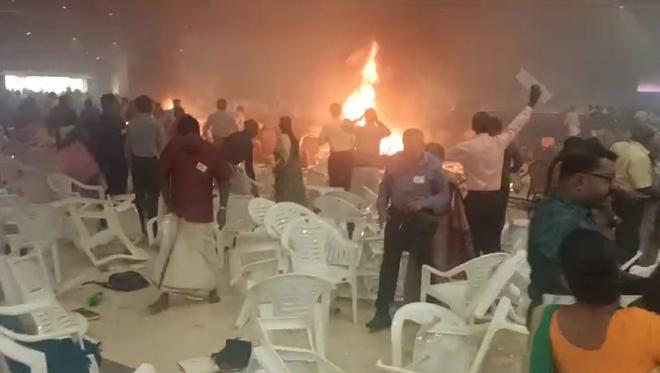
Pradeepan learned later that his youngest child, 12-year-old Libina, had succumbed to injuries; she was one of the three people who died in the tragedy. Saly, 45, and Praveen, 24, are battling for their lives. Saly has suffered over 50% burns on her body and Praveen, 60%. Rahul, 21, is also in hospital with burns, but doctors have told Pradeepan that he is stable.
Three victims are in “an extremely critical condition,” say health authorities. Soon after the explosions, 41 people who were injured, mostly with burns, were rushed to the Government Medical College Ernakulam, in Kalamassery, besides various private hospitals in Kochi city.
EDITORIAL | Terror in bags: On the blasts in Kerala
A ball of fire in the hall
Around 5 a.m. the same morning, Martin V.D., 57, left his rented house on Comrade Khader Road in Kuthapady in Thammanam division of Kochi Corporation on his white gear-less scooter, according to Jaleel B.A., his landlord of six years. Martin’s wife, a homemaker, and his 20-year-old daughter who recently got a job in a private company, were reportedly sleeping in the adjoining room. Martin allegedly told his wife, who was half-asleep, that he was heading out, but did not provide details. A medium-built, bespectacled, moustached man of average height, Martin hardly seemed like a lone wolf who was on a mission to wreak havoc.
Martin rode about 27 km to an apartment that he owned and had rented out in Athani, near Cochin International Airport. He collected two large shopping bags from there, which, the police say, contained two sets of crude Improvised Explosive Devices (IEDs). He then proceeded to the convention centre at around 7.15 a.m. The place was largely deserted. Martin planted the IEDs under chairs, according to investigators.
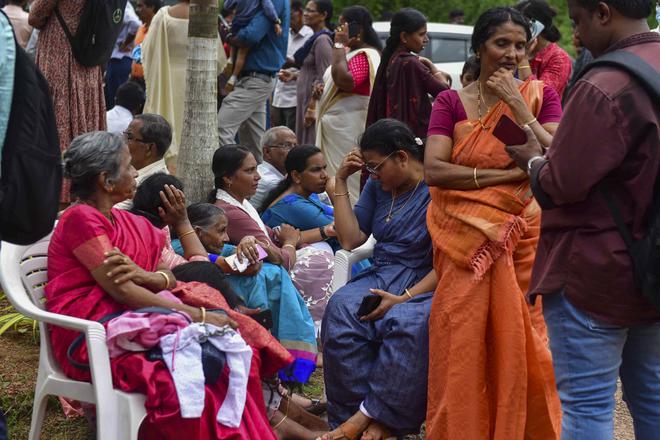
“Since there was no security threat, there was no need to deploy security guards or seek police protection,” says Roby Thomas, who was part of the congregation when the IEDs went off. “An adequate number of volunteers had been deployed to ensure the safety of the premises and to streamline parking.”
Most of the participants were middle-aged women from across the State. Children of different age groups were also present. As the meeting got under way, Martin, seated at the back, allegedly triggered the IEDs using a remote control. He recorded the ghastly scene on his mobile phone and walked out, say the police.
Ashwin says his eyes were closed when he heard the deafening sound and felt a burning sensation on his face. When he opened his eyes, he saw a huge ball of fire in the hall. He also found to his shock that his hair was burning.
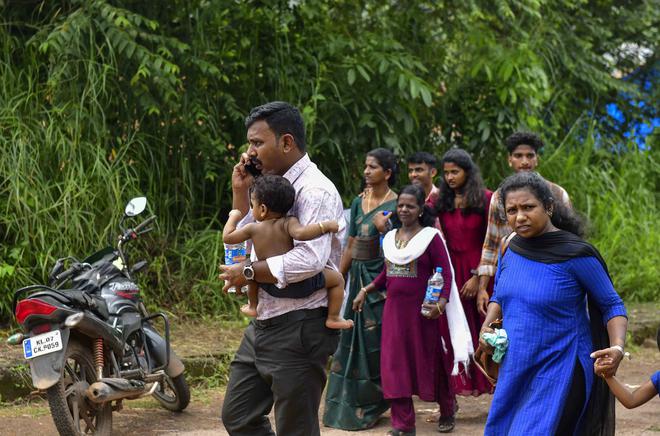
“I looked for my friends and saw them running towards the exit. As I followed them, I heard another blast behind me,” he says, recounting the incident from the hospital bed.
Vineetha Jim, 37, a homemaker from Kalady who had attended the meeting with a seven-member family, shudders as she imagines how much worse the tragedy could have been. Her son Jerald Jim, 13, suffered 7% burns on his palms and legs.
Apart from Libina, Leona Paulose, 55, and Kumari Pushpan, 53, lost their lives in the tragedy.
Leona, who hailed from South Iringole in Rayamangalam in Ernakulam Rural, was found charred beyond recognition. Hospital and health authorities say it took nearly a day and a half to identify her remains. They took her son’s DNA samples to confirm her identity. “Leona taught evangelism and walked around the neighbourhood distributing pamphlets. She did not interact much with her neighbours. She had lost her husband and her son is abroad. He has now returned,” says Kurian Paul, panchayat member.
Kumari was a worker under the Mahatma Gandhi National Rural Employment Guarantee Scheme from Kaliyar in Thodupuzha in neighbouring Idukki district.
A confession and an arrest
As news of the blasts broke, senior members of the Kerala Cabinet and the entire top brass of the State Police descended on the city. Union Home Minister Amit Shah rang up Kerala Chief Minister Pinarayi Vijayan. Teams of the National Investigation Agency (NIA) and the National Security Guard were dispatched to the State as the blasts seemed to have the makings of a terror attack.
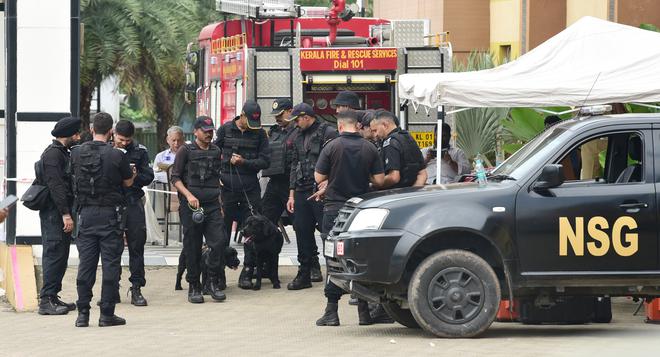
By then, Martin had left Ernakulam district and entered Koratty town in neighbouring Thrissur on his scooter. He checked into room 410 at a lodge using his Aadhaar card and paid ₹1,500 through UPI, say staff at the lodge. “But he came down within 15 minutes. He said a relative had had an accident and he had to leave immediately,” says an employee.
During his brief stay at the lodge, Martin reportedly made multiple Facebook posts admitting to his role in the explosions and arguing why he acted against the congregation. He claimed to be a “non-serious” follower of Jehovah’s Witnesses for 16 years before quitting six years ago because of the “anti-national” nature of their teachings. “They tell members of the congregation to desist from singing the national anthem. Adult members are told not to cast their votes and not to join civil or military service. I needed to react since I found such teachings a danger to the society,” he wrote furiously on social media posts that have since been taken down by the police.
From the lodge, Martin rode along the national highway, stopping only to ask directions to the nearest police station.
At around 1 p.m., he walked into Kodakara police station in Thrissur. He waited patiently for some time and then confessed to the startled officer in-charge of the general diary, that he was the man responsible for the Kalamassery blasts.
The officer did not take him seriously at first. But when Martin showed the police the videos of the explosions on his mobile phone, they were shocked and immediately took him into custody.
For three hours after his surrender, Martin was questioned at the Kerala Police Academy in Thrissur. He was then taken by armed guards to the Kalamassery Armed Reserve Camp. A Special Investigation Team (SIT), led by S. Sasidharan, Deputy Commissioner (Kochi City), questioned him for 30 hours, with officials of the NIA also joining in once in a while.
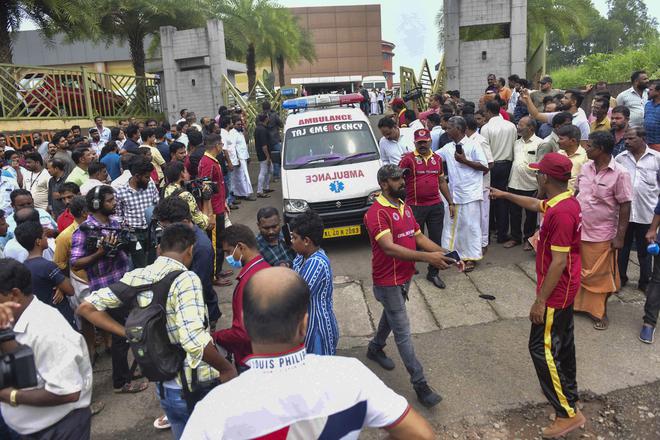
The SIT learned that the accused had spent less than ₹4,000 on 50 gundu (locally made high-impact crackers), eight litres of petrol, a few remote controls and batteries, and a simple circuit to assemble crude IEDs with the help of a YouTube tutorial. “He had packed two big shopper bags with 25 gundu and 4 litres of petrol each, which, when detonated remotely, turned into a fireball,” say senior police sources.
The police say Martin had bought the crackers from the temple town of Thrippunithura, petrol from various petrol pumps, and remotes and batteries from an electrical shop in Ernakulam. He had reportedly worked as a foreman in a country in West Asia for a while. But what they found particularly intriguing was that he spared them the hard work of collecting evidence. Instead, Martin produced nearly all the evidence against himself, including invoices of the purchases he made, besides the video shot on his mobile phone.
“He was remorseless. He kept confessing to the crime and even wanted to be convicted by the court so that the world would know the purpose of his action,” say the police. They say that Martin has not been taken to a psychologist yet.
The police visited Martin’s rented house at Thammanam and his apartment at Athani. He had reportedly assembled the IEDs on the terrace of the Athani house.
The Kalamassery police filed a First Information Report before the Principal District and Sessions Court, Ernakulam, invoking against him the Unlawful Activities (Prevention) Act, 1967; Sections 302 (murder) and 307 (attempt to murder) of the Indian Penal Code; and provisions of the Explosive Substances Act, 1908.
The SIT arrested Martin a day later. Officials say they wanted to first verify his account and check whether someone aided him. They also collected the CCTV footage of Martin’s movements. Though the police are seeing this largely seen as an open-and-shut case, they are determined to probe all the possible angles in keeping with the Chief Minister’s public assurance.
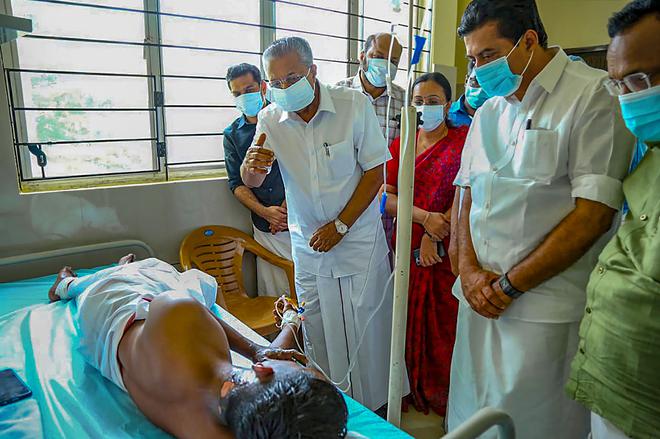
Jaleel, the landlord who is a cloth merchant in Kochi, was shocked to see his silent tenant’s image being flashed across television channels on October 29. “He was mild-mannered. He did not interact much with anyone. He left for West Asia after his job as a spoken English instructor was affected by the pandemic. He was attached to his family, especially his daughter. When he returned from abroad a couple of months ago, he went straight to the hospital where she had been admitted with dengue,” recalls Jaleel.
Martin has been remanded to judicial custody till November 29 by the Principal District and Sessions Court, Ernakulam.
Jehovah’s Witnesses
The terror attack has led to a lot of curiosity about Jehovah’s Witnesses. The group does not believe in the Holy Trinity, which holds that god the Father, god the Son, and god the Holy Spirit are one entity. Instead, they believe in Jesus as the Son of god and Jehovah as god. Jehovah’s Witnesses say they are Christian, but do not identify as Protestant or Catholic. They have no priests, and do not approve of traditional priesthood as it is practiced in some other Christian groups. There are about 57,000 Jehovah’s Witnesses in India, of which about 15,000 are in Kerala.
Satish Joseph, national spokesperson of Jehovah’s Witnesses, says, “We believe in the Bible and practise and live by its principles. We never try to suit the Bible according to our life but lead life in harmony with it.” Satish adds that the investigation will reveal the actual truth and motive of the person accused of carrying out the blasts.
Jehovah’s Witnesses do not join national armies as soldiers as they believe in being neutral during times of war. They do not seek public office or join politics. They do not accept blood transfusions. And they refuse to adhere to symbols of nationalism. Jehovah’s Witnesses grabbed headlines in Kerala in 1986 after three siblings from a family of the group’s followers were expelled from school for refusing to sing the national anthem. They were re-admitted after the Supreme Court ruled in their favour. In the wake of the blasts, the group has temporarily called off conventions in the southern States.
“Jehovah’s Witnesses are not part of any Christian denomination,” says Jacob G. Palackkapilly, deputy secretary general, Kerala Catholic Bishops Council. “It is a cult which traces its origin to a U.S.-based business group. It bears more similarity to Judaism. None of the mainstream Christian churches maintains any links with it.”
The blasts have also led to hate-mongering on social media. Some people held a particular community responsible for the blasts. The police have launched cases against scores of such people, including Union Minister Rajeev Chandrasekhar and BJP spokesperson Anil Antony.
Amid this, Pradeepan’s grief is solitary. He spends his days shuttling between the two hospitals where his wife and sons have been admitted and the morgue of the Government Medical College, where Libina’s body is kept.
Pradeepan does not want to lay the child to rest yet. He is praying that his wife will recover and see their daughter one last time.







